Biography
Born Isabelle Amélie Cottiaux in Paris, Bogelot was the daughter of Antoine André Cottiaux, a cotton trader, and Marie Anne Thérèse Cottiaux, from Cambrai. Orphaned at a young age (her father died when she was 2 and her mother when she was 4), she was adopted by the family of the sisters, Maria Deraismes and Anna Féresse-Deraismes. [1]
On May 7, 1864, she married Gustave Bogelot, a lawyer for the Court of Appeal of Paris. [2] The couple had at least two children. [3] This was the beginning of a long collaboration, similar to that of the couple Jules and Julie Siegfried. Her husband, who wrote several works on the question of prisons, was very involved in philanthropic activity: he was the secretary of the Société générale des prisons, vice-president of the Commission of the Hospice of Boulogne-sur-Seine for over 20 years, member of the board of directors of the Œuvre des libérées de Saint-Lazare from 1890, and spokesperson for that organisation at various congresses. When he died in 1902, Isabelle Bogelot stated that they did “nothing without considering it together”. [4]
Philanthropy
Although she was first made aware of feminist issues in Maria Deraismes's family, and later of social issues by her husband, Isabelle Bogelot considered that she only had a “philanthropic revelation” in 1876, when her husband brought her a bulletin of the Œuvre des libérées de Saint-Lazare. [5] She then realized that it was her duty – in her own words – to devote herself to these issues. [6] Two days later, she attended one of the charity's meetings and met Émilie de Morsier and Sarah Monod.
The Œuvre des libérées de Saint-Lazare, [7] or Society for Women Freed from Saint-Lazare, created in 1870 by Pauline Grandpré, [8] aimed to help women and children freed from prisons, in order to protect them from recidivism: “helping women in the present, thinking about their future by educating them, providing them a livelihood and increasing their dignity through work”. [9]
Two years later, she became the deputy to Caroline de Barrau, followed by director general of the Œuvre in 1887. From 1883 onwards, temporary shelters were created to house women and their children upon leaving prison. The charity was recognized as a public interest organization on 26 January 1885.
The Franco-Prussian War led her to become interested in the efforts to help the military wounded. In 1886, she obtained the second prize for her nursing diploma, and a paramedic diploma the following year (both programmes created by the Women's Union of France).
She also founded, with Maria Martin and Émilie de Morsier, the Women's League for Peace and Union Among Peoples. She died in Boulogne-sur-Seine.
Feminism
Bogelot's role in the Œuvre des libérées de Saint-Lazare propelled her to the international scene, where she represented the organisation at various events: [10]
Isabelle Bogelot was equally a major figure on the French feminist scene. In 1889, she and Émilie de Morsier organised the first congress of women's organisations and institutions, held in Paris on the margins of the Exposition Universelle. Sarah Monod was also a member of the congress committee chaired by Jules Simon. Losing no momentum, they created the Conference of Versailles, designed to gather “all women interested in philanthropy” each year. The meeting was international, hosting women from all over Europe and the United States as well as from Africa.
Bridging French and American feminists, Isabelle Bogelot, supported by the President of the International Council of Women May Wright Sewall, convened an initiative committee to form the French section of the international association, the National Council of French Women, of which Sarah Monod was the president, and Isabelle Bogelot the honorary president. In 1906, the Assistance Section, led by Eugénie Weill, [11] won one of the council's first fights: Isabelle Bogelot became the first woman appointed to the National Supreme Council for Assistance and Public Health.
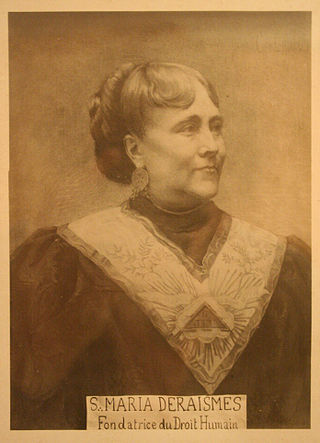
Maria Deraismes was a French author, Freemason, and major pioneering force for women's rights.
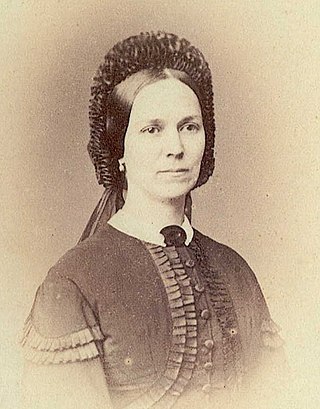
Victoire Léodile Béra was a French novelist, journalist and feminist. She took the name of André Léo, her two twin sons' names.

Eugénie Mouchon-Niboyet was a French author, journalist and early feminist. She is best known for founding La Voix des Femmes, the first feminist daily newspaper in France.
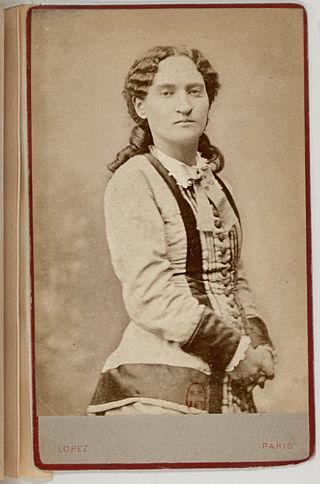
Paule Mink was a French feminist and socialist revolutionary of Polish descent. She participated in the Paris Commune and in the First International. Her pseudonym is also sometimes spelled Minck.

Julie Siegfried was a French feminist. She served as president of the Conseil National des femmes françaises between 1913 and 1922.

Élie Reclus was a French ethnographer and anarchist.
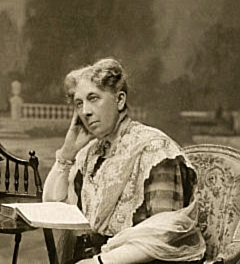
Marguerite de Witt-Schlumberger was a French campaigner for pronatalism, alcoholic abstinence, and feminism. She was the president of the French Union for Women's Suffrage movement. She married into the Schlumberger family and became a powerfully influential matriarch and the mother of several sons who achieved notability in their own right. An activist in international women's rights circles, Witt-Schlumberger was a leading suffragist at the Paris Peace Conference in 1919. For her active involvement and service to the government, she was awarded the Croix of the French Legion of Honour in 1920.
Aline Valette (née Alphonsine Goudeman was a French feminist and socialist. She believed that society should provide support to women engaged in motherhood, the most important of all occupations.

Eliska Vincent was a Utopian socialist and militant feminist in France. She argued that women had lost civil rights that existed in the Middle Ages, and these should be restored. In the late 1880s and 1890s she was one of the most influential of the Parisian feminists. She created extensive archives on the feminist movement of the 19th and early 20th centuries, but these have been lost.
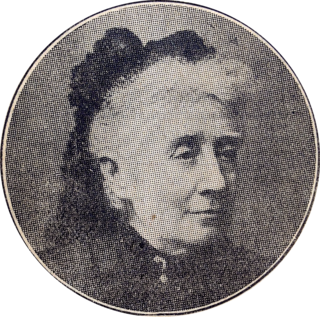
Marie Maugeret (1844–1928) was a French novelist and conservative Catholic who became a feminist and was active in promoting Christian feminism as an antidote to socialism.

Sarah Monod was a French Protestant philanthropist and feminist.

Claire Démar (1799–1833), was a feminist, journalist and writer, member of the Saint-Simonian movement. The avant-garde nature of her writings has led to her current recognition.
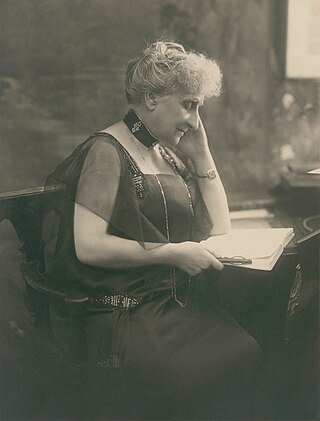
Ghénia Avril de Sainte-Croix was a French author, journalist, feminist and pacifist. For many years she led the French branch of the International Abolitionist Federation, which sought to abolish state regulation of prostitution and fought trafficking in women. She advised the French government and the League of Nations on women's issues. She was vice-president of the International Council of Women from 1920 and President of the National Council of French Women from 1922 to 1932.
Émilie de Morsier was a Swiss feminist, pacifist and abolitionist.

Caroline de Barrau (1828–88) was a wealthy French educationalist, feminist, author and philanthropist. She became interested in the education of girls, created a school in Paris where her daughter was taught, and encouraged her daughter and other young women to successfully apply for admission to the University of Paris, previously a male-only institution. She belonged to international feminist associations, investigated the conditions of working women in Paris, was a leader in the campaign to eliminate state-regulated prostitution, helped prostitutes reenter society after being released from prison and provided aid to abandoned infants. She was the author of several books on women's issues.

Léon-Pierre Richer was a French free-thinker, freemason, journalist and feminist who worked closely with Maria Deraismes during the early years of the feminist movement in Paris. He edited Le Droit des femmes, a feminist journal that appeared from 1869 to 1891. He was founder of the Ligue française pour le droit des femmes, one of the main feminist organizations in France in the 1880s. However, Richer was concerned that women were not sufficiently educated in republican principles, and that giving them the vote could cause a clericalist and monarchist reaction and the loss of democracy.
Le Droit des femmes was a French feminist journal that appeared from 1869 to 1891. It was founded and edited by Léon Richer, and in the early days supported financially by Maria Deraismes. The newspaper supported many women's causes, but always avoided directly supporting women's suffrage. It was one of the longest running journals of its type in the 19th century.

The National Council of French Women is a society formed in 1901 to promote women's rights. The first members were mainly prosperous women who believed in using non-violent means to obtain rights by presenting the justice of the cause. Issues in the first half century included the right to vote, legal equality between husband and wife, paternal child support, social support for children, equal employment opportunity, equal pay for equal work and acquisition of citizenship on marriage. The National Council of French Women is affiliated with the International Council of Women (ICW). Now the oldest of French feminist organizations, it continues to work for causes related to the rights of women.

The French Union for Women's Suffrage was a French feminist organization formed in 1909 that fought for the right of women to vote, which was eventually granted in 1945. The Union took a moderate approach, advocating staged introduction of suffrage starting with local elections, and working with male allies in the Chamber of Deputies.

Anna Féresse-Deraismes was a French feminist activist for women's rights and a Freemason. She was appointed honorary president of the International Congress of Women in 1896 and 1900, and was a founding member of the first mixed-gender Masonic Order, Le Droit Humain. Maria Deraismes was her sister.


















